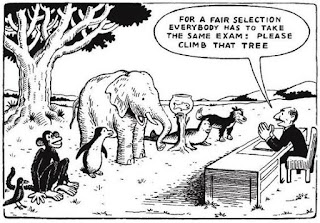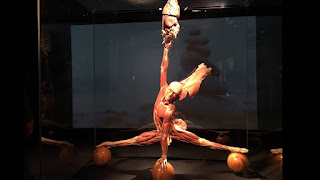Week 1: Two Cultures
Blog Post #1: Two Cultures
 |
| The education system which leads to lost genius. |
In Toward a Third Culture: Being in between, author Victoria Vesna makes mention of John Horgan — a journalist who spent years working for the magazine Scientific American. In 1996 Horgan wrote a piece questioning whether science had met its end; whether or not any further advancements could be made. The scientists of his day were quick to denounce his speculation, and Vesna proposes that Horgan “does not take into account the possible emergence of group genius or endless mutations of disciplines that truly do result in something new,” and further posits that every end constitutes a new beginning.
 |
| The decision I had to make in high school. |
What’s interesting to me is how quickly Horgan’s thesis is discredited, but that the analogous debate in regards to whether art has met its end is still raging. Perhaps this is a consequence of the “Two Worlds” we have been learning about — that science tends towards one “correct” solution, while art usually champions many possible answers, and the two do not often intersect. I believe both art and science are intertwined with society and culture, and that the positive feedback loops are so strong, that neither art nor science can possibly meets its end unless culture is first extinguished (extinction of humanity). That art and culture drive each others’ progress is likely intuitive to you, but that science and culture do too may require some explanation. Scientific research is conducted by individual people whose interests are inevitably influenced by the society they find themselves in. Further, research requires funding, which can come from either the public or private sector. These funds are allocated due to cultural values and interests.
 |
| Economics majors should be able to and required to take classes less focused on mathematics. |
If we accept that both art and science are driven by culture, then it should be obvious that they intersect and we should be living in C.P. Snow’s “Third Culture.” But they largely don’t, and we largely aren’t. I tend to agree with the idea that our schooling system causes this. Art classes were always a highlight for me in elementary and middle school, but when I got to high school I found that I couldn’t take any if I also wanted to be in the literature and science courses that universities value highly for my subject of study — economics. Once at UCLA, the GE system allowed me take a couple of art classes, but the system needs reform. It hasn’t gone far enough in integrating academia.
Works Cited
Chabra, Gauri. "ART VS SCIENCE." Jammu Kashmir Latest News J&K, 8 Oct. 2016, Web. www.dailyexcelsior.com/art-vs-science/.
Horgan, John. The End of Science. New York: Basic Books, 2015. Print.
Kelly, Kevin. "The Third Culture" Science 13 February 1998: Vol. 279 no. 5353 pp. 992-993. Web.
Rea, Shilo. "Dietrich College of Humanities and Social Sciences." Carnegie Mellon Launches First-of-Its-Kind Behavioral Economics, Policy and Organizations Major - Dietrich College of Humanities and Social Sciences - Carnegie Mellon University, 21 Dec. 2016, Web. www.cmu.edu/dietrich/news/news-stories/2016/december/first-behavioral-economics-major.html
Russell, Micah. "The Education System: 'Now Climb That Tree.'" The Marquette Educator, 18 Dec. 2014, marquetteeducator.wordpress.com/2012/07/12/climbthattree/.
Snow, C. P. The Two Cultures and the Scientific Revolution. New York: Cambridge UP, 1959. Print.
theRSAorg. “RSA ANIMATE: Changing Education Paradigms.” YouTube, 14 Oct. 2010. Accessed April 7, 2018. Web. www.youtube.com/watch?v=zDZFcDGpL4U.
Vesna, Victoria. "Toward a Third Culture: Being In Between." Leonardo. 34 (2001): 121-125. Print.



Tyler, as a fellow economics major, I totally agree with your notion of reform for our class requirements. I'm a junior now and have completed my GEs, which has left me with primarily upper division economics classes to take. I wish the curriculum would incorporate a more well-rounded set of classes rather than just mathematics-based courses (perhaps something like a course on how economics influences art!)
ReplyDelete